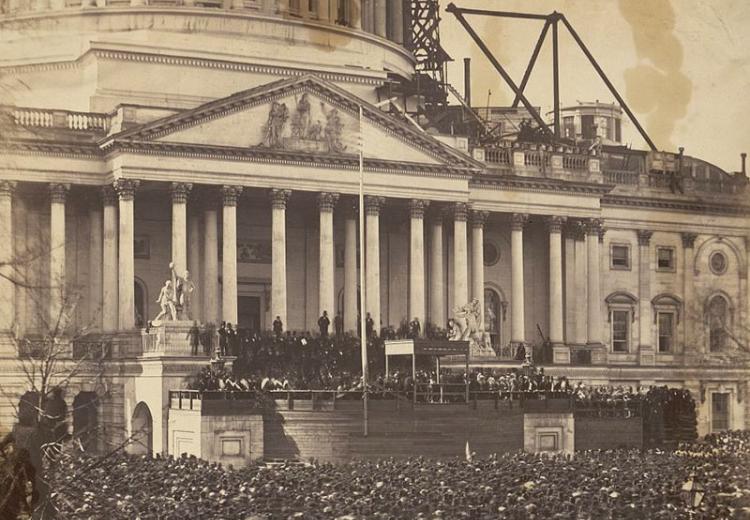Lesson 2: The First Inaugural Address (1861)—Defending the American Union

Photo of Lincoln’s first inauguration, March 4, 1861. The nation was on the brink of war.
"Plainly, the central idea of secession, is the essence of anarchy." With this statement, Abraham Lincoln tried to show why the attempt of seven states to leave the American union peacefully was, in fact, a total violation of law and order. The Constitution required that the newly elected president of the United States take an oath to "preserve, protect and defend the Constitution of the United States," and so Lincoln explained how he would keep that Union together. Exactly one month before Lincoln delivered his First Inaugural Address on March 4, 1861, a provisional Confederate States of America had already drawn up a constitution and elected officers. Moreover, the departing president, James Buchanan, added to the new president's difficulties. While his December 1860 State of the Union Address argued that secession was not "an inherent constitutional right," Buchanan saw no constitutional provision that empowered the president "to coerce a state into submission."
Lincoln read the federal constitution differently, stating "the declared purpose of the Union that it will constitutionally defend, and maintain itself." But he also affirmed that "there needs to be no bloodshed or violence; and there shall be none, unless it be forced upon the national authority." To this end, he used his inaugural address to try to mend the rift between sections of the nation that would soon go to war. Lincoln closed his First Inaugural Address by appealing to "the better angels of our nature" as his fondest hope for preserving the union of the American states.
This lesson will examine Lincoln's First Inaugural Address to understand why he thought his duty as president required him to treat secession as an act of rebellion and not a legitimate legal or constitutional action by disgruntled states.
Guiding Questions
How did Lincoln defend the American union from states seeking to leave or "secede" from the Union?
Learning Objectives
Explain provisions of the federal constitution that Lincoln believed empowered him to defend the American union from attempts at secession.
Explain how some secessionists defended their attempt to leave the union upon Lincoln's election to the presidency.
Articulate why Lincoln thought he had a constitutional obligation as president to preserve the Union from attempts at secession.
